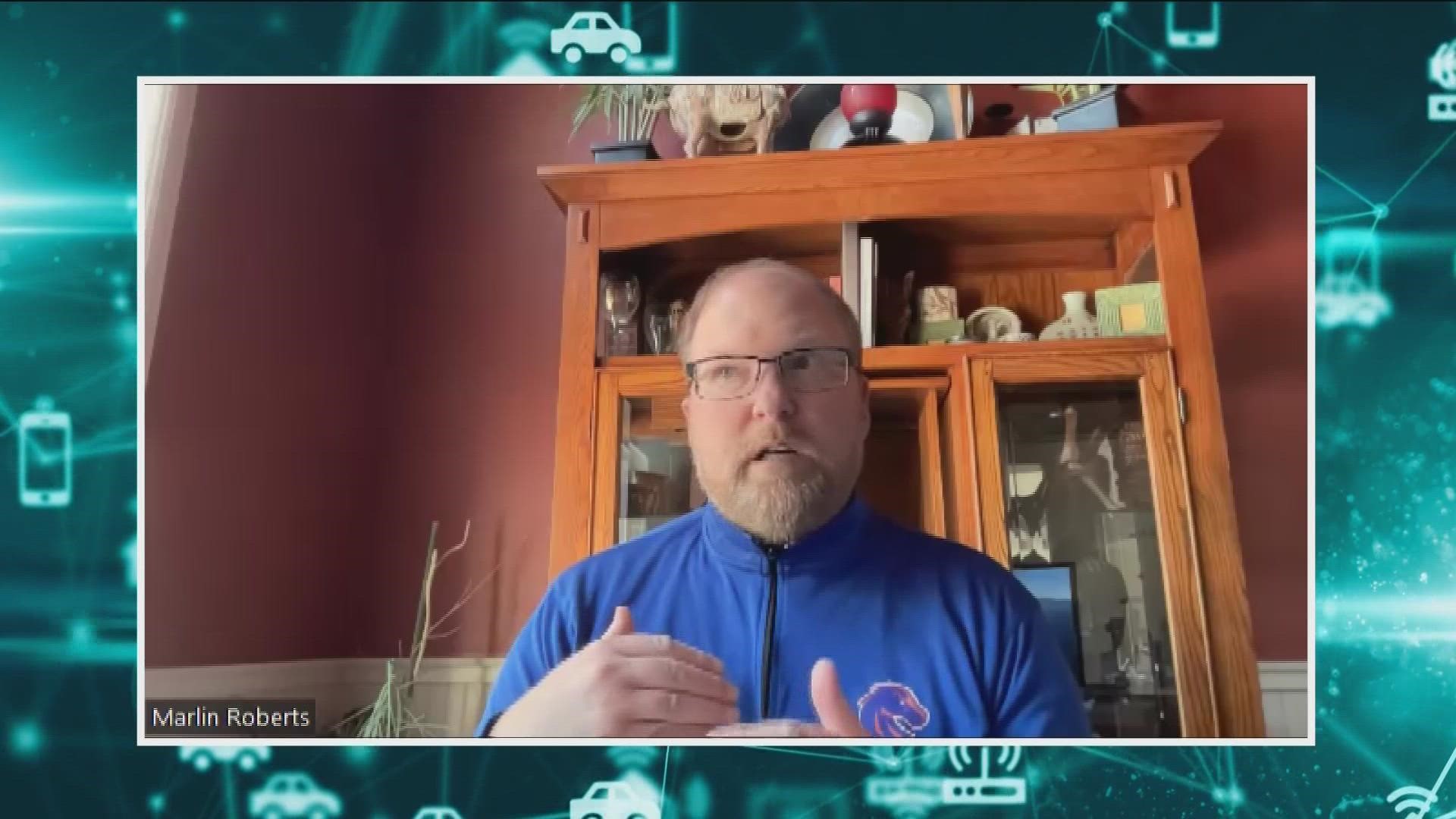BOISE, Idaho — Whether it's through email or text message, scammers and hackers are constantly creating new ways to steal personal data and infrastructure every day. With their evolving processes, a Boise State University cybersecurity expert said businesses and agencies need to have a role in place to combat and protect information.
"Well, the days of being safe simply because you were small and unimportant are gone," BSU's Institue for Pervasive Cybersecurity's CyberDome manager, Marlin Roberts said. "The cybercriminals are interested in just about anything. The advent of ransomware has made it lucrative to go ahead and steal data to basically extort money from these entities."
However, the increased need for cybersecurity professionals does not match the number of people available to help fill the roles.
According to CyberSeek, an online tool that tracks employment opportunities for cybersecurity jobs, there are more than 5,000 cybersecurity jobs open around Idaho. Nearly 3,500 openings are in the Boise Metro area.
A report in 2021 from the Idaho Department of Labor showed openings for cybersecurity jobs in 2020 increased by 160% since 2015.
The Institute of Pervasive Cybersecurity's CyberDome wants to help meet that need. The program pairs cybersecurity students with rural communities and businesses in Idaho, such as townships and water districts, in need of the service.
Roberts said the idea is to give students a real-world experience, while also protecting valuable data and infrastructure for those entities in need.
"They just simply can't afford to bring in a commercial entity to provide those managed security services and that's where we fill the gap," Roberts said.
The opportunity to fill those gaps around the Gem State has become more of a possibility thanks to funding by the Idaho Workforce Development Council.
"One of the things the council is really interested in and focused on is, 'How do we better integrate work-based learning into all forms of education?'" Executive Director of the Council, Wendi Secrist said.
The Council works alongside the Idaho Governor's Office and are tasked with the creation and implementation of a statewide comprehensive strategic workforce development plan. They work with kindergarten through post-secondary education, community aid agencies and non-profits around the state.
"All of the organizations that are helping to feed in, develop and connect people to careers," Secrist said.
The Institute at Boise State was awarded $806,000 by the Council. The Training Fund Industry Sector Grant will allow 84 students to train and work with the CyberDome over the next three-year period. Roberts said that about doubles the number of students they have.
"It's going to actually increase the depth of services we can offer to our clients, students will get experience in risk assessment, penetration testing and as well as valuable experience," Roberts said. "It's a winning combination."
Secrist said the CyberDome meets what she and others on the Council are hearing from employers, especially when it comes to cybersecurity: They're looking for people who are coming in with real-world experience.
"If an individual is graduating with a certificate or a degree in cybersecurity and they have no practical experience, if I were in the CEO seat or a chief technology officer, I'd have a hard time letting them start working on my live network and company assets," Secrist said.
The state is becoming very aware of how crucial cybersecurity jobs are and how the need isn't going away, Secrist said. That is why the council is investing in other programs besides universities as well, such as trade schools or local school districts' cybersecurity programs.
"It doesn't require somebody to go and earn a four-year degree, then a masters degree and then go into it," Secrist said. "We have options to help with apprenticeship programs."
Boise School District's Dennis Technical Education Center (DTEC) offers a wide variety of Career and Technical Education (CTE) programs, like networking and cybersecurity programs, for its juniors and seniors. The Council said they work with DTEC to connect students to apprenticeships or into higher education schools for cybersecurity.
"That gives them the opportunity to really go three different directions, they can go straight into industry, they can go straight to a post-secondary option to continue their education or in many cases, what we're hoping for is they do both," Sean Kelly, the assistant principal and career development advisor for DTEC.
Kelly said the cybersecurity program is fairly new to DTEC but with the need for cybersecurity roles so high, he has plans to make it more well known. He said last year the program had around 90 students and this upcoming school year is looking the same.
"We're here one of the best-kept secrets in Boise," Kelly said.
He is looking to build more partnerships around the Treasure Valley to create more opportunities for students if they go into the industry right out of high school.
"If you take a senior in high school, you can mold them in your company and train them at those entry levels where they're coming in with some skills and then they just keep growing with you," Kelly said "Especially with an apprenticeship, the apprentices tend to stay with the company that they apprenticed with."
With cybersecurity now an evolving process, programs like CyberDome do not see any slow down in sight for the industry. Roberts said they need to continue to train people to put more experts out into the workforce.
"I don't think this is a ball we can drop and easily pick back up," Roberts said.
People do not need to be part of Boise State to be part of CyberDome, the program also works with the College of Western Idaho, College of Southern Idaho, College of Eastern Idaho University of Idaho and more around the state.
Watch more Local News:
See the latest news from around the Treasure Valley and the Gem State in our YouTube playlist:

